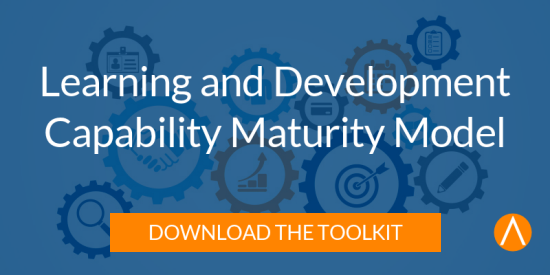Posted by Laura Riskus ● June 11, 2015
5 Questions to Ask When Selecting a Learning Management System
 The selection of a learning management system can have serious long-term ramifications for a learning and development organization, so it's important to ask the right questions and weigh your options carefully.
The selection of a learning management system can have serious long-term ramifications for a learning and development organization, so it's important to ask the right questions and weigh your options carefully.
Whether your company is selecting an LMS for the first time, or your learning function is expanding and additional tracking features are required, there are certain considerations you need to clarify before deciding which technology is right for you. Picking the optimal LMS for your unique situation will go a long way toward avoiding common LMS pain points.
Here are five questions to ask when choosing an LMS.
 1. What functionality do we really need?
1. What functionality do we really need?
Identify the "must have" and the "like to have" features before meeting with any vendors. At first glance, many prepackaged LMS solutions may look like exactly what you were looking for—or they may even offer features you didn't even know you wanted. But all that functionality may be more than you really need; you're not only taking on unnecessary expense, but more complex systems mean more frequent upgrades and more administrative headaches.
As a learning team, identify what you absolutely must have, and what would be nice to have before you go to meet with any vendors. Think about tasks that are currently manual that could be automated. If your learners are mobile, you may want to consider an LMS that can be used on a tablet or mobile device.
Be sure to engage HR and IT in this discussion. They have knowledge and that can help identify additional features based on their previous experience or future plans. Likewise, you need to make sure that your IT structure can support the solution. Invite your IT department to ask questions that address version compatibility and integration with the existing software architecture.
2. What kind of support will the vendor supply?
Clarify LMS ownership, support, and governance roles with the vendor, making sure to involve the IT and HR departments in the discussion. There are many different versions of this—sometimes it is a partnership, and sometimes there is an opportunity to build a relationship with the vendor. Because the learning department should be focused on managing an effective learning and development strategy, LMS administration will run more smoothly if IT support, whether by your internal tech staff or provided by the vendor, is clearly delineated.3. Who will own the learning data?
Ideally, training through the LMS will be tied to career paths, development, or evaluation; unfortunately, learning data is typically owned by HR. Most likely, that information will need to be identified and manually entered into the system. Coordinating that arrangement with the HR team well in advance can allow you get the most bang for your LMS buck.
4. Will the technology upgrade be worth the resulting process changes?
An oft-overlooked challenge whenever new technology is introduced to an organization is around changes in process that must accommodate the different system. If you already have a very solid, smooth process, be sure that the LMS complements and supports the process. Any process changes that affect jobs require more than just communication, and would best be handled with a change management plan. Regardless, identify related areas of change well in advance of LMS implementation.5. What conversion assistance does the vendor offer?
This is critical if you're upgrading from a "home-grown" LMS, and it can make or break your rollout date. If you are already tracking information, whether on a spreadsheet or a database, you don't want to have to maintain two systems. In addition, if you've been tracking learning data for awhile, you don't want to lose that history. If your archives are not integrated with the new LMS, it will be clumsy and challenging to execute meaningful reporting in the future.
Preparation is key, and once you have all of these LMS considerations answered, making your decision will be a much easier process.
Topics: Learning Technologies

